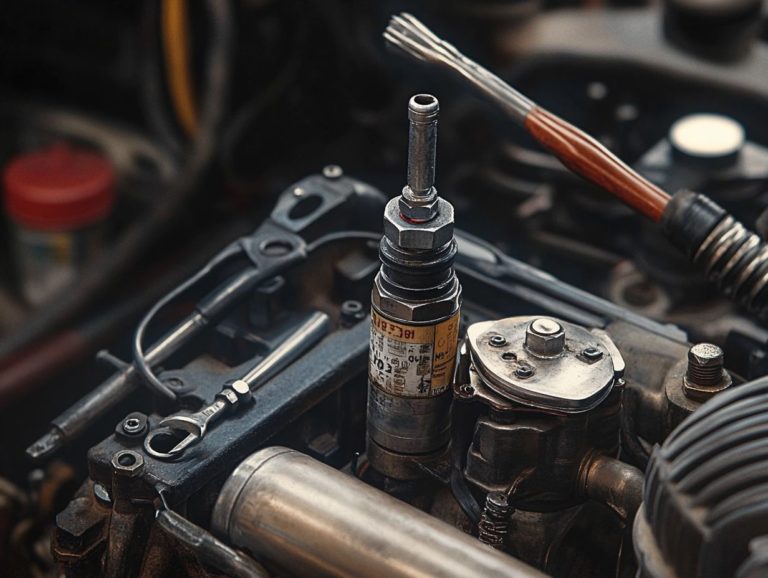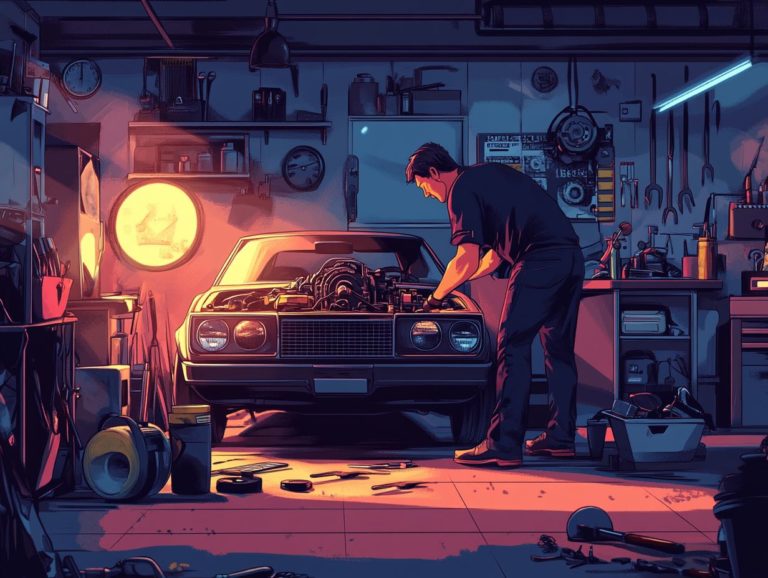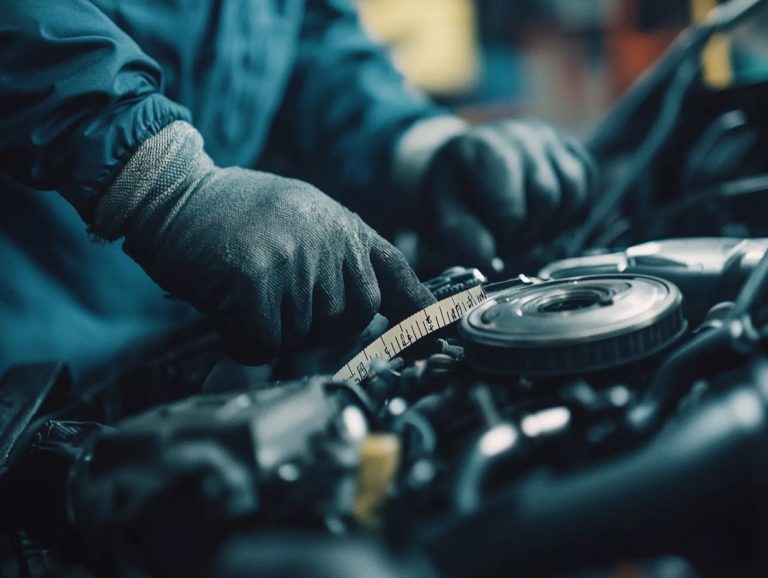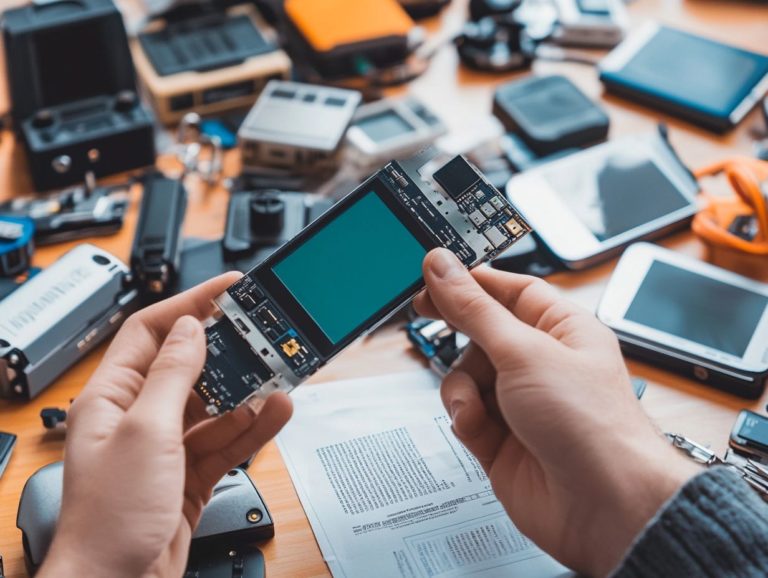The Basics of Car Electrical System Maintenance
The car’s electrical system is the heartbeat of modern vehicles, powering everything from your headlights to the latest infotainment systems.
Understanding its components and functions is essential for you as a car owner. This knowledge enables you to identify potential issues before they escalate into bigger problems.
Get ready to dive into signs of electrical problems, maintenance tips, and basic checks to keep your car running smoothly!
Contents
- Key Takeaways:
- Understanding the Car Electrical System
- Signs of Electrical System Issues
- Regular Maintenance for Optimal Performance
- How to Perform Basic Electrical System Checks
- Common Electrical System Problems and Solutions
- Preventative Measures for Avoiding Electrical System Failures
- Frequently Asked Questions
- Why is it important to maintain my car’s electrical system?
- What are some signs that my car’s electrical system needs maintenance?
- How often should I perform maintenance on my car’s electrical system?
- Can I perform car electrical system maintenance on my own?
- What are some common causes of car electrical system problems?
- How can I prevent car electrical system problems?
Key Takeaways:

- Regular maintenance ensures your car s electrical system performs at its best. Don t skip those checks!
- Be aware of warning signs of electrical system issues such as dimming headlights or a dead battery. Troubleshoot and repair problems promptly to avoid further damage.
- Preventative measures, such as keeping the battery terminals clean and avoiding overloading the system, can help avoid common electrical system problems. Consult a professional for complex issues.
Understanding the Car Electrical System
Understanding the car’s electrical system is essential for ensuring proper automotive care. It is fundamental to the overall functionality of your vehicle.
A well-maintained electrical system guarantees that crucial components like the battery, starter, and alternator work seamlessly together to supply the necessary electrical current, allowing your engine to operate reliably.
Knowing about electrical system diagnostics helps you identify potential issues. This understanding enables car mechanics to troubleshoot effectively and execute preventive maintenance for optimal performance.
For those residing in areas such as Columbia, Jefferson City, and St. Louis, pursuing automotive technology training can significantly enhance your understanding and skills in maintaining these vital systems.
Components and Functions
The core components of your vehicle’s electrical system namely the battery, starter, and alternator are essential for smooth operation. Each serves a vital purpose.
Think of the battery as the powerhouse; it stores the energy you need to start the engine and run accessories when your vehicle is off.
When you turn the key, the starter motor kicks in, drawing power from the battery to get the crankshaft spinning, effectively bringing the engine to life.
Once the engine roars to life, the alternator steps in, converting mechanical energy into electrical energy. It recharges the battery and powers your vehicle’s electrical systems, ensuring everything runs seamlessly.
These components work in perfect harmony, with the alternator providing a steady stream of electricity while the battery delivers that crucial initial burst of power.
In this intricate dance, each part not only performs its specific role but also enhances the overall performance and reliability of your vehicle.
Signs of Electrical System Issues
Recognizing the signs of electrical system issues in your vehicle can be a game changer. It can save you both time and money by preventing further damage.
Keep an eye out for common warning signs like flickering lights, trouble starting the engine, or unusual sounds from the starter motor these could all indicate an electrical system malfunction.
In addition, conducting regular battery health checks and inspecting the electrical wiring can help you catch problems before they escalate.
Ignoring these symptoms might lead to blown fuses, alternator power fluctuations, and a host of other complications that will likely require professional automotive repair services.
Stay proactive, and you’ll keep your vehicle running smoothly. Act now to protect your vehicle and avoid costly repairs later!
Common Warning Signs
Common warning signs of an electrical system malfunction include dimming headlights, dashboard warning lights, and inconsistent engine performance. Each of these indicators is a crucial alert, suggesting potential issues that could compromise your vehicle’s overall health.
For example, dimming headlights might indicate a failing alternator or battery, putting your nighttime visibility and safety at risk.
Dashboard warning lights, often displayed as symbols or colors, provide essential information about various systems, such as the charging system or engine components, signaling that immediate attention is needed.
Inconsistent engine performance can show up as stalling, rough idling, or poor acceleration, often hinting at electrical issues that could be affecting critical sensors or spark plugs.
By recognizing and addressing these signs promptly, you can prevent further damage and ensure a reliable driving experience.
Regular Maintenance for Optimal Performance
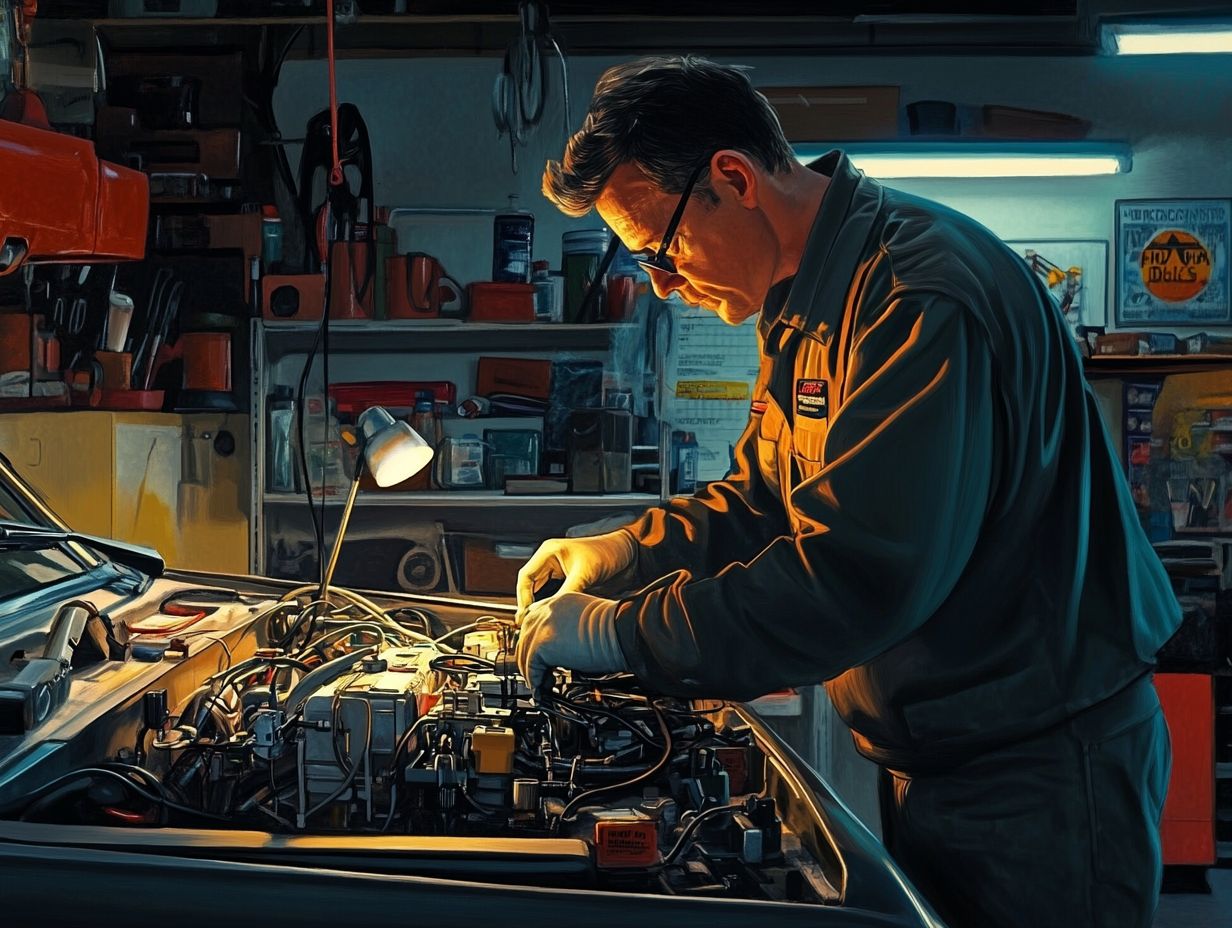
Regular maintenance is crucial for optimizing the performance of your vehicle’s electrical system. It demands a well-defined schedule and proactive preventive services. This entails routine tasks like cleaning battery cables to ward off corrosion, inspecting drive belts for proper operation, and applying corrosion removal chemicals whenever needed.
Overlooking these maintenance tasks can lead to electrical component failure, which not only incurs costly repairs but also diminishes the overall significance of automotive care. This highlights the importance of a diligent approach to maintaining your vehicle.
Recommended Maintenance Schedule
A recommended maintenance schedule for your vehicle’s electrical system emphasizes the importance of regular battery health checks and diagnostics to catch potential issues before they escalate.
To maintain optimal performance over time, it’s wise to conduct these checks every six months especially before seasonal changes that might affect battery efficiency. In addition, you should inspect wiring and connections at least once a year to prevent corrosion and potential failures.
If you frequently embark on longer trips, consider quarterly diagnostics for added peace of mind. Lastly, keeping an eye on fuses and relays should be woven into your routine maintenance, ensuring you avoid unexpected electrical failures while out on the road.
How to Perform Basic Electrical System Checks
Conducting basic electrical system checks is essential for every vehicle owner, equipping you with the knowledge to identify potential issues before they spiral out of control. While your DIY inspections can certainly be effective, recognizing when to bring in a professional is key to ensuring comprehensive diagnostics and repairs.
Critical checks include:
- Evaluating the health of your battery
- Testing the starter motor’s functionality
- Scrutinizing the electrical wiring for any signs of wear or damage
By enlisting the expertise of an automotive technician especially one with specialized auto technology training you gain valuable insights into the electrical well-being of your vehicle.
DIY vs Professional Inspection
Regarding assessing your vehicle’s electrical system, deciding between a DIY inspection and a professional evaluation can profoundly influence your results.
It’s crucial for vehicle owners to understand the nuances of these two approaches. DIY inspections can be both cost-effective and empowering, giving you the chance to familiarize yourself with your vehicle’s components. However, this method may lead to overlooking complex issues that truly require expert insight.
In contrast, professional evaluations, though generally more expensive, offer advanced diagnostics and a comprehensive understanding of intricate problems. While routine maintenance might be well-suited to a DIY check, sudden electrical failures definitely call for a professional’s expertise to ensure safety and reliability.
Ultimately, recognizing the significance of professional inspections especially for complicated issues can mean the difference between minor repairs and expensive damage.
Common Electrical System Problems and Solutions
Common electrical system problems can greatly affect your vehicle’s performance. It’s essential to have effective troubleshooting and repair strategies at your fingertips.
Issues often arise from blown fuses or fluctuating alternator power. These disruptions affect the electrical current necessary for optimal engine operation. By understanding these potential pitfalls, you can navigate the automotive repair landscape more effectively. This ensures that your battery, starter, and alternator collaborate seamlessly to keep your vehicle running smoothly.
Troubleshooting and Repair Tips

Effective troubleshooting and repair tips are crucial for addressing electrical system malfunctions in your vehicle.
Adopting a systematic approach helps you pinpoint issues, whether you’re dealing with a flickering dashboard light or a complete power failure. Start by checking the battery connections and fuses; these are often the usual suspects behind many electrical problems.
Next, examine the wiring for any signs of damage or corrosion. These can lead to poor connections. A multimeter, a device that measures electrical voltage, can be invaluable in diagnosing voltage discrepancies.
If the issues continue even after these initial checks, consult a professional. Deeper electrical problems may require specialized knowledge and tools for proper resolution.
Preventative Measures for Avoiding Electrical System Failures
Implementing preventive measures for your car’s electrical system is a wise strategy. It allows you to avoid failures and enhance longevity.
Regular maintenance services, such as routine battery health checks, comprehensive diagnostics of the electrical systems, and meticulous cleaning of battery cables, are essential for maintaining optimal functionality.
By embracing these practices, you can significantly minimize the risk of electrical issues and extend the lifespan of your automotive components. This preserves the integrity of your vehicle s performance.
Tips for Keeping Your Car’s Electrical System in Top Shape
To maintain your car’s electrical system in peak condition, prioritize regular preventive maintenance. Ensure the battery cables are thoroughly cleaned.
Schedule routine inspections to catch any potential issues before they escalate. Carefully examine the alternator, starter, and all wiring connections for signs of wear or corrosion. Inspect fuses and relays, as they are crucial for the proper functioning of various electrical components. Keeping the battery terminals clean and securely fastened helps you avoid unexpected failures.
By adopting these best practices, you can significantly reduce the risk of electrical problems. This ensures your vehicle operates smoothly and reliably.
Frequently Asked Questions
Why is it important to maintain my car’s electrical system?
Maintaining your car’s electrical system is crucial for ensuring the proper functioning of essential components, such as the battery, alternator, and starter. Regular maintenance prevents potential breakdowns and extends the lifespan of these parts.
What are some signs that my car’s electrical system needs maintenance?
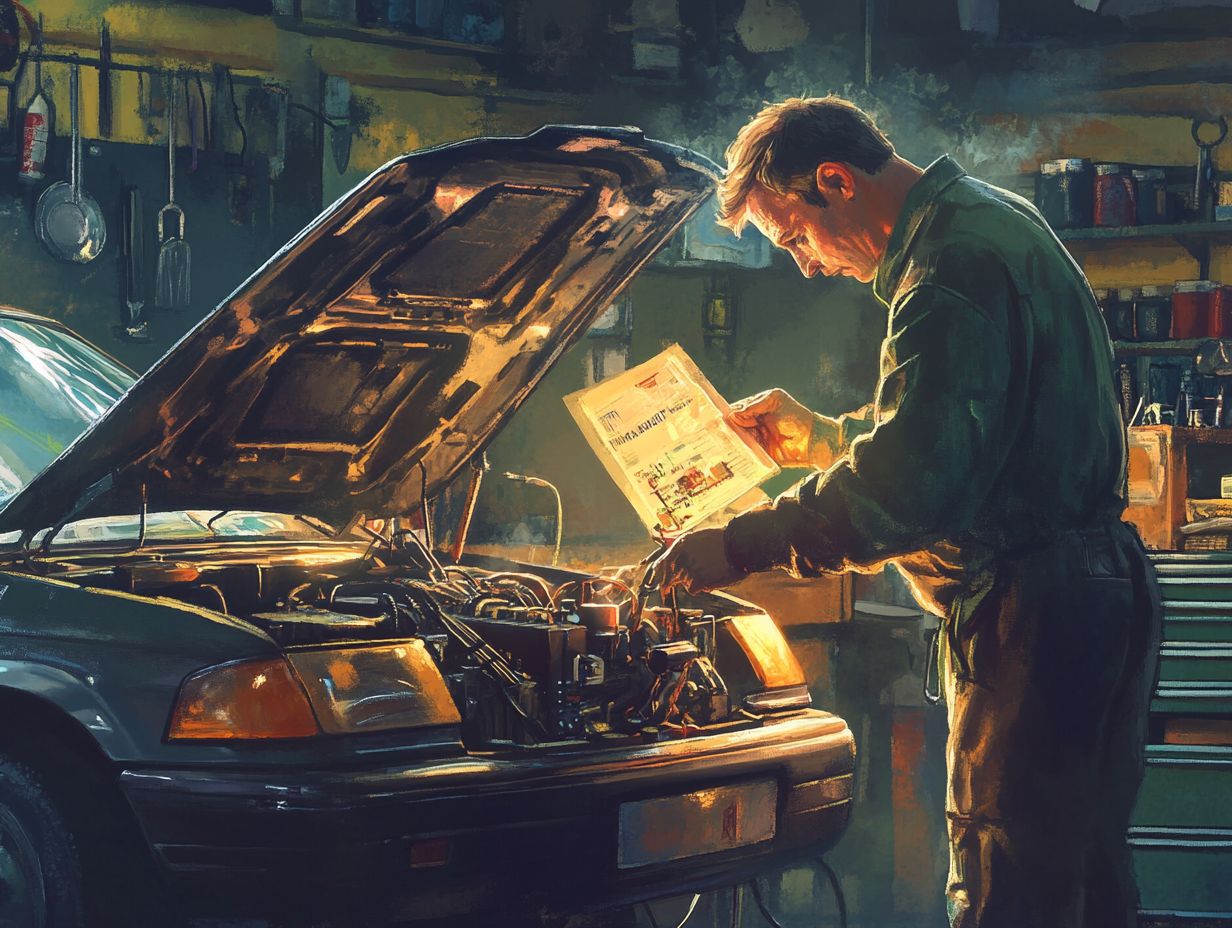
If you notice dimming or flickering headlights, difficulty starting the engine, or issues with the radio and other electronic components, it may be time for maintenance on your car’s electrical system.
How often should I perform maintenance on my car’s electrical system?
It’s recommended to check your car’s electrical system every year or every 12,000 miles, whichever comes first. However, if you notice any issues, it’s best to have it checked immediately.
Take proactive steps in maintaining your vehicle s electrical system. Schedule your next inspection or check your wiring for signs of wear today!
Can I perform car electrical system maintenance on my own?
You can handle basic tasks like checking and cleaning the battery terminals at home. For more complex issues, it’s wise to hire a professional mechanic.
What are some common causes of car electrical system problems?
Common causes include a battery that doesn’t work, a worn-out alternator, and damaged wiring. Extreme temperatures and neglecting regular maintenance can make these problems worse.
How can I prevent car electrical system problems?
Protect your car today! Regular maintenance helps, along with avoiding overloading your vehicle’s electrical system. Keep your battery clean and address issues promptly.

